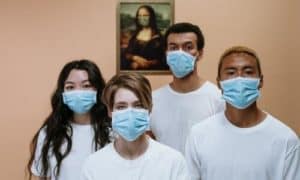
Lesions or Ulcers
According to a study published in the Journal of Dental Research, over 80% of patients that were hospitalized with COVID-19 noticed lesions or ulcers in their mouths. Why would this happen as a result of respiratory disease? Well, the truth is, the respiratory system begins in the mouth and the nose, so it’s not uncommon for these areas to be affected. Keep in mind, ulcers should go away on their own. If they don’t schedule an appointment with your dentist in Beverly Hills. Besides ulcers and lesions, some patients also experience something coined “COVID tongue.” The symptoms of COVID tongue can range from loss of papilla (the teeny bumps on the tongue), enlarged tastebuds, or a burning taste or sensation.
Dry Mouth
Dry mouth is estimated to affect up to 65% of the population and is not a unique side effect of COVID-19. However, it can develop or become worse during or after infection. When we get sick with COVID, the virus can cause salivary glands to underproduce saliva. Healthy saliva flow is what allows our mouths to feel moist and comfortable, and it also helps reduce the risk of decay. Without enough saliva, the mouth may feel overly dry, you may experience bad breath, and you may be more likely to develop serious health problems such as gum disease. If you’re suffering from a dry mouth, drink lots of water every day, chew gum, and make sure to talk with your dentist in Beverly Hills.
Inflammation
One of the main concerns associated with COVID-19 is how the body responds to the infection, causing sometimes extreme levels of inflammation in certain parts of the body. This inflammation can also occur in the mouth. The gums are usually the most obviously affected, and COVID-19 long-haulers may notice red, swollen, and sometimes bleeding gums after recovery. It’s important to keep an eye on gum inflammation as it can also lead to or be a sign of gum disease. Gum disease does have connections to overall health and has been linked to an increased risk of heart disease, stroke, and respiratory disease. With that said, those with active gum disease when they become infected with COVID are more likely to have a serious case.
While some people find COVID-19 recovery simple, some of the 400 million people infected continue to experience long-term side effects. If you’re one of them and you have lingering oral health side effects, don’t hesitate to contact your dentist in Beverly Hills to schedule an appointment.

